« My joy and my invincible enthusiasm are my driving force! I’ve always considered myself an enthusiast because enthusiasm is a state of grace»
Jacques Canetti
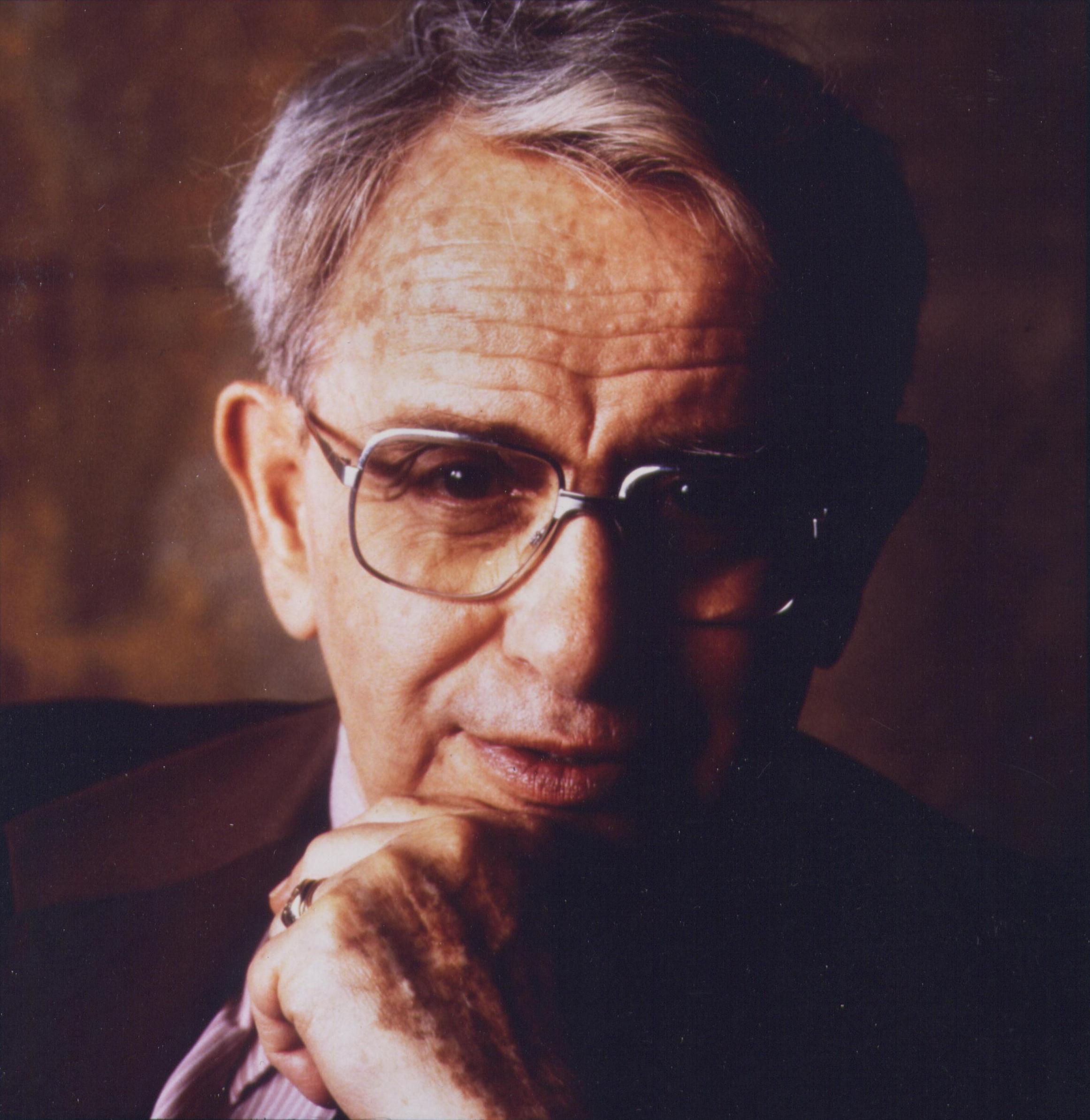
« My joy and my invincible enthusiasm are my driving force! I’ve always considered myself an enthusiast because enthusiasm is a state of grace»
Jacques Canetti
Surely a water-diviner, perhaps a sorcerer, Jacques Canetti needed only his own talent to make others blossom. An untiring explorer, an unrepentant discoverer and insightful pioneer, for decades he was the Christopher Columbus of chanson française, revealing the greatest to themselves when they were still unknown. Combining faith and instinct, Jacques Canetti made the sun rise upon great careers: from la môme Piaf to Georges Brassens, from Charles Trenet to Jacques Higelin, not forgetting Brigitte Fontaine, Jacques Brel, Félix Leclerc, Boris, Guy Béart, Serge Gainsbourg, Fernand Reynaud, Raymond Devos, Michel Legrand, Serge Reggiani… and many more.
« Jacques Canetti managed to be the first, the one who understands, the one who unveils, a real discoverer of talent »
Véronique Mortaigne in Le Monde

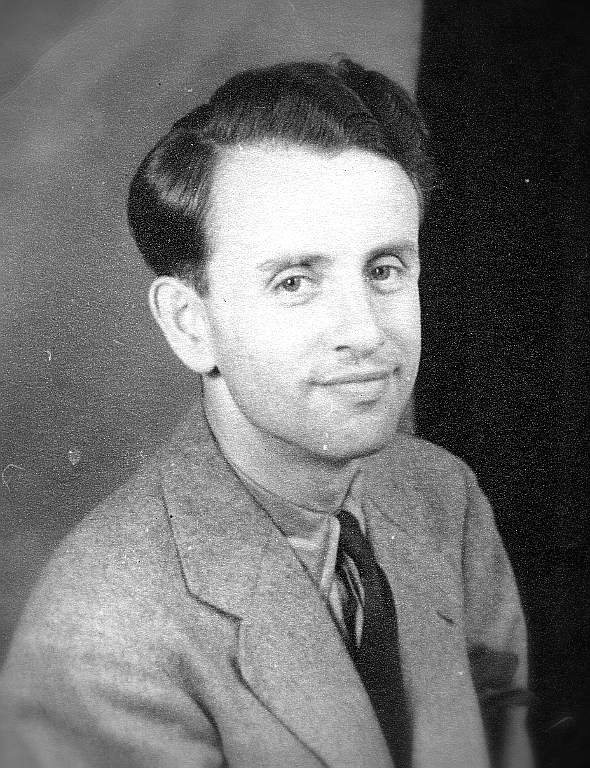
Born in 1909 in Roustouck, Bulgaria and raised in England, Jacques Canetti studied in Vienna, Frankfurt and Lausanne before immigrating to France in 1926 during the rise of Nazism.
Cultivated and European before his time, he spoke 4 languages, played the piano and possessed an excellent knowledge of music.
In 1928, he was accepted at the HEC Business School and then discovered music hall. He dropped out and in 1930 he started working for Polydor, the company that represented the prestigious Deutsche Gramophone and its treasures of classical music. Jacques Canetti was 21 years old. He wandered the studios and attended the recordings of Boléro directed by Maurice Ravel himself. He was responsible for the first ever recording of Alban Berg’s Suite lyrique with the Galimir Quartet and recordings by the young pianist Clara Haskil.
In 1934, Jacques Canetti managed to record the inimitable Marlene Dietrich with songs that he had specially written for her in French.
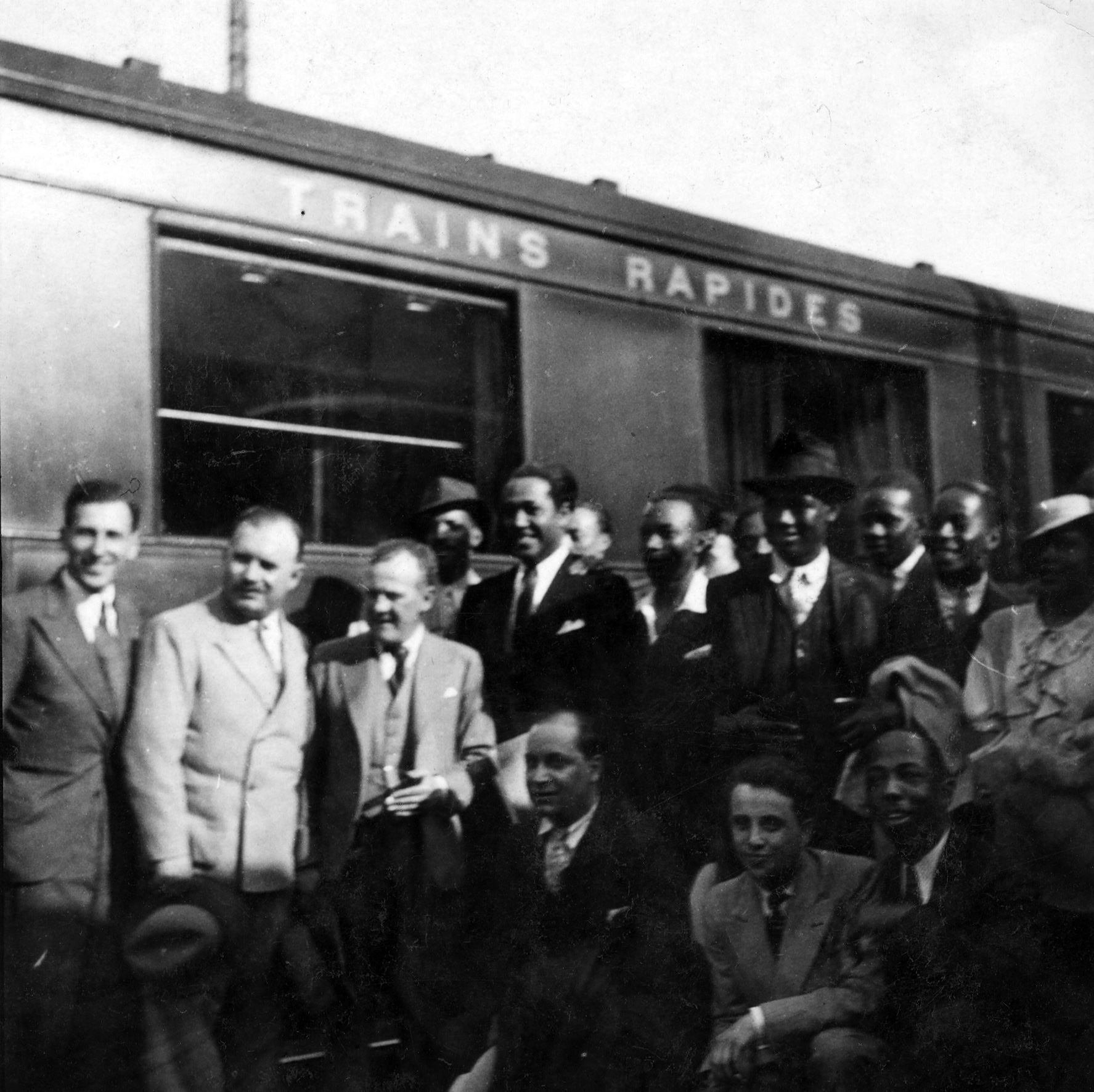
Crazy about jazz, Canetti hosted the first hot jazz radio show every Monday night on the Poste Parisien. In 1932, he became the French correspondent of Melody-Maker. In 1931, Jacques Canetti brought Duke Ellington to France for the first time, followed by Louis Armstrong and the Mills Brothers in 1933. He organized their first concerts and tours in Europe.
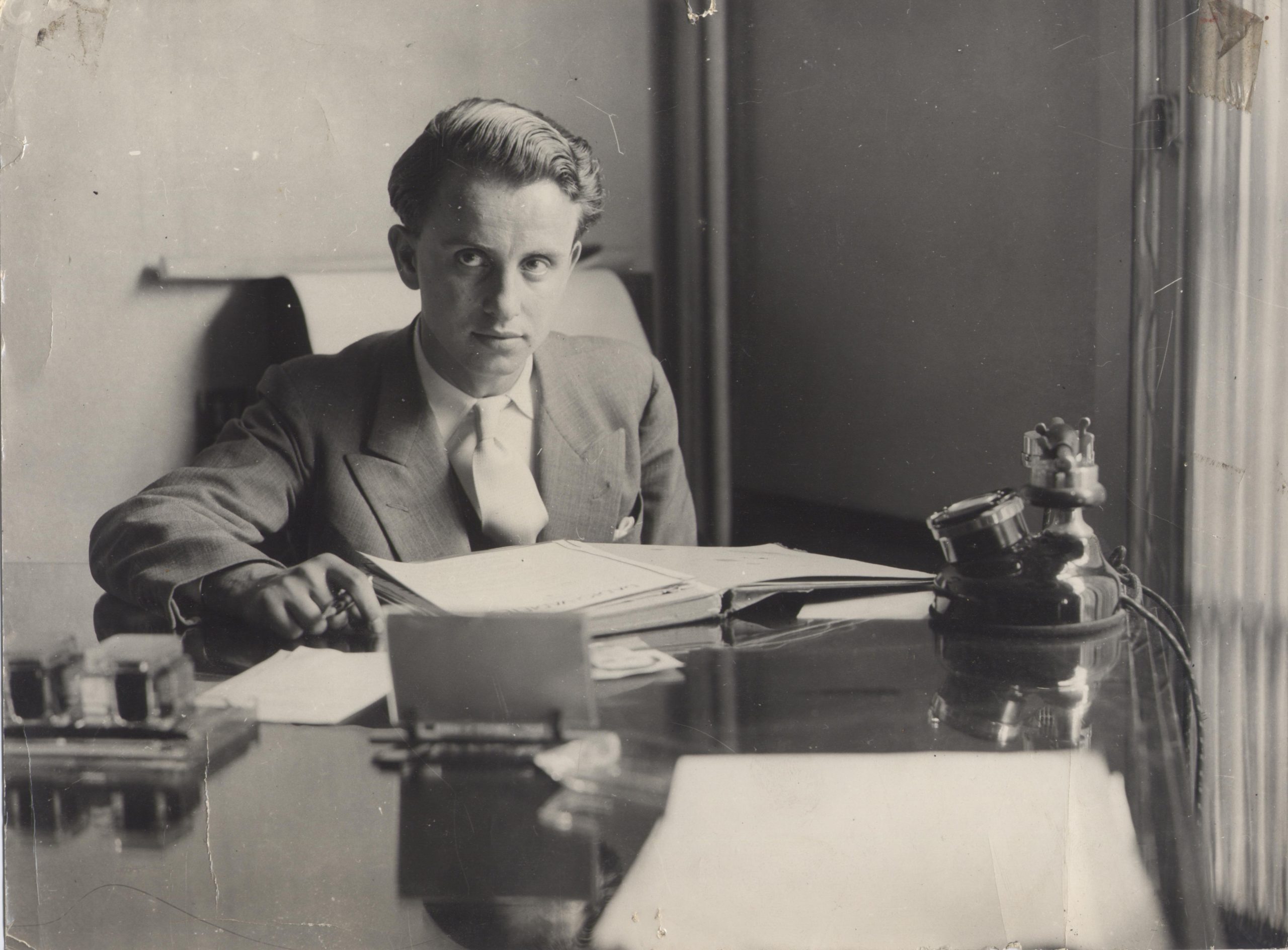
In 1935, he was “spotted” by Marcel Bleustein-Blanchet, the founder of Publicis, who had just created Radio-Cité. Artistic director of the station between 1935 and 1940, he invented, with Marcel Bleustein-Blanchet, all the concepts for radio that still exist today: outside broadcasting, “live” shows, one minute reviews, soap operas, advertising, sponsorship by big brands, jingles… in particular with the Dop and Monsavon ad campaigns.
We also owe the creation of radio competitions and the Music-hall des jeunes to Jacques Canetti. Thanks to these, listeners of Radio-Cité discovered a number of budding young artists such as Charles Trenet, Lucienne Delyle and Edith Piaf for whom he produced the first records.
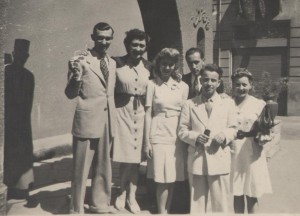
After the debacle and the arrival of anti-Jewish laws, Jacques Canetti left Paris in the beginning of 1940 for the southern zone (Toulouse) with Pierre Dac, Jeanne Sourza, Raymond Souplex and Françoise Rosay. Canetti had the idea of creating the first Artist’s Cooperative, the ACPA, which toured the free zone.
Thanks to Françoise Rosay, he made it to Algiers on the 11th of November 1942 at the time of the Allied landings. He then took over the management of Radio-Alger and immediately renamed it Radio France. But Jacques Canetti quickly left his position. He made a decisive encounter: that of René Capitan, General de Gaulle’s representative in North Africa.
In Algiers, Canetti founded the troupe du Théâtre des Trois Anes with the songwriters Pierre-Jean Vaillard, Georges Bernardet, Christian Vebel and the singers Lucienne Vernay, Geneviève Mesnil and Clairette May. From 1943 to 1945, the troupe des Trois Anes travelled across all of North Africa – from Algeria to Egypt – and collected funds for the COMBAT movement.

In 1946, having returned to Paris, Jacques Canetti went back to work as artistic director for Polydor. The catalogue had grown old, with the exception of Edith Piaf. La môme Piaf had become Edith Piaf. Despite their friendship, Edith had musical demands that Polydor could meet and so the catalogue needed rebuilding. The first beginner recorded by Jacques Canetti in 1948 was Charles Aznavour, who was at the time in a two man show with Pierre Roche.
Records are good…but they are only a partial answer to the question: how to promote new artists and build new careers ? That is where Jacques Canetti had the wonderful idea of combining three “professions” that until then were quite distinct: the stage, recordings and tours. The combination of the three resulted in the development of a veritable “launch pad” that Jacques Canetti constructed from A to Z.
At the end of 1947, Canetti opened the Théâtre des Trois Baudets. In 1950, having obtained his license to organise tours, he created the company Radio-programme which organised tours for more than twenty years in all the francophone countries. Finally, in 1951, Philips bought the Polydor record label. All of the artists from Polydor followed as one their artistic director : Jacques Canetti.
In 1947, Jacques Canetti found a rundown dancehall on Rue Coustou. He rented it and decided to create the Théâtre des Trois Baudets from scratch. After heavy construction work, the Théâtre des Trois Baudets was inaugurated on the 15th of December 1947. The theatre had 247 red velvet seats, a small 15m2 stage and four dressing rooms for the artists. After a difficult slow start, it was at the Théâtre des Trois Baudets that the era of singer-songwriter-performer was born with which Jacques Canetti’s name will forever be associated.
« I love unexplored paths, trials, hope, struggles, I either like or I don’t, but I always try to understand»
Jacques Canetti
That’s the place where, during 2, 3 or maybe even 4 years, as yet unknown artists such as Félix Leclerc, Georges Brassens, Jacques Brel, Guy Béart, Serge Gainsbourg, Francis Lemarque, Anne Sylvestre, Bobby Lapointe and Raymond Devos, to mention only a few, performed every night.
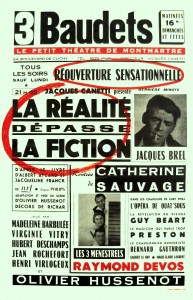
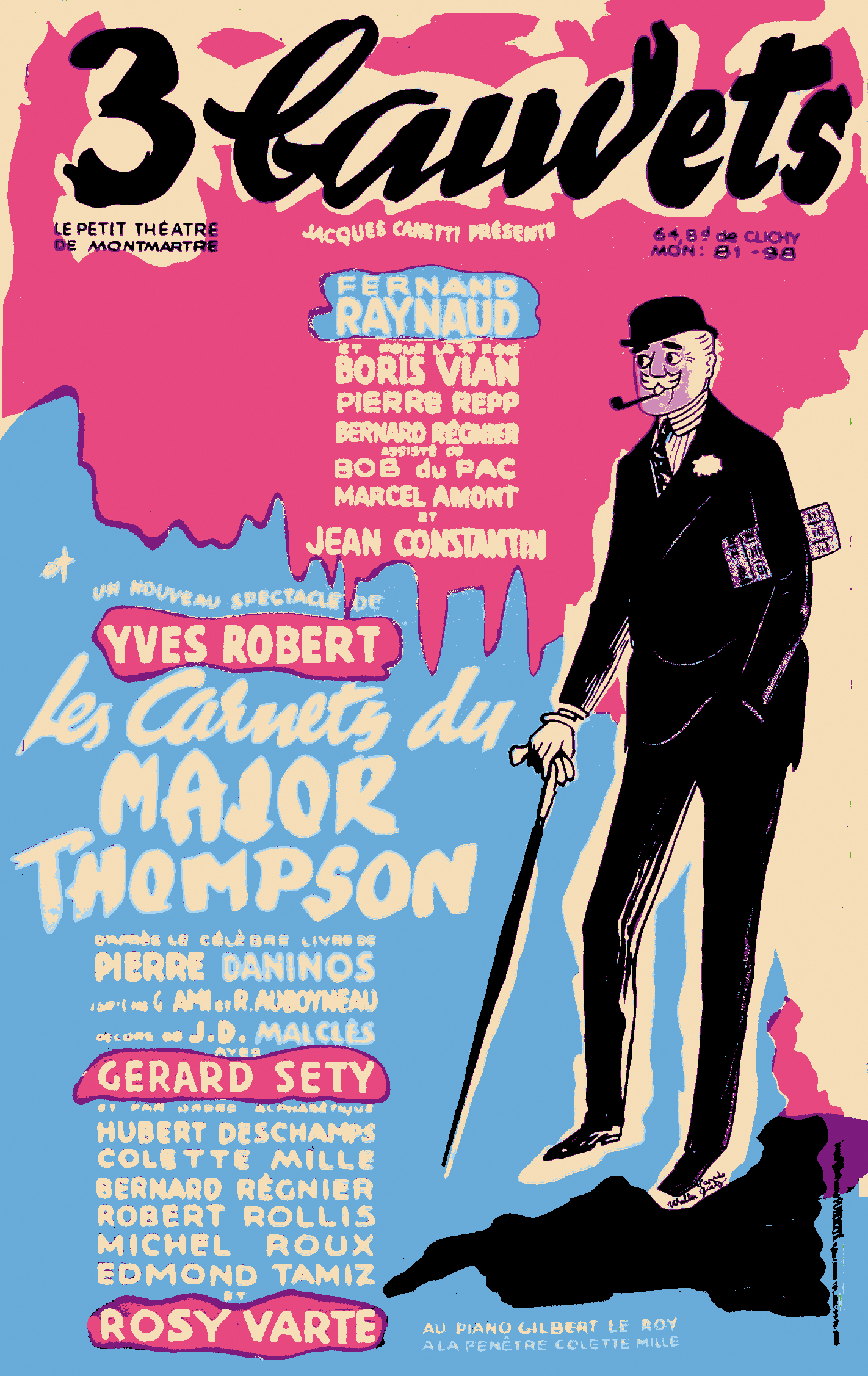
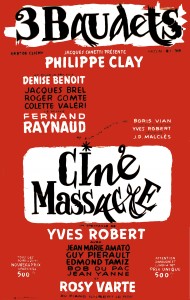
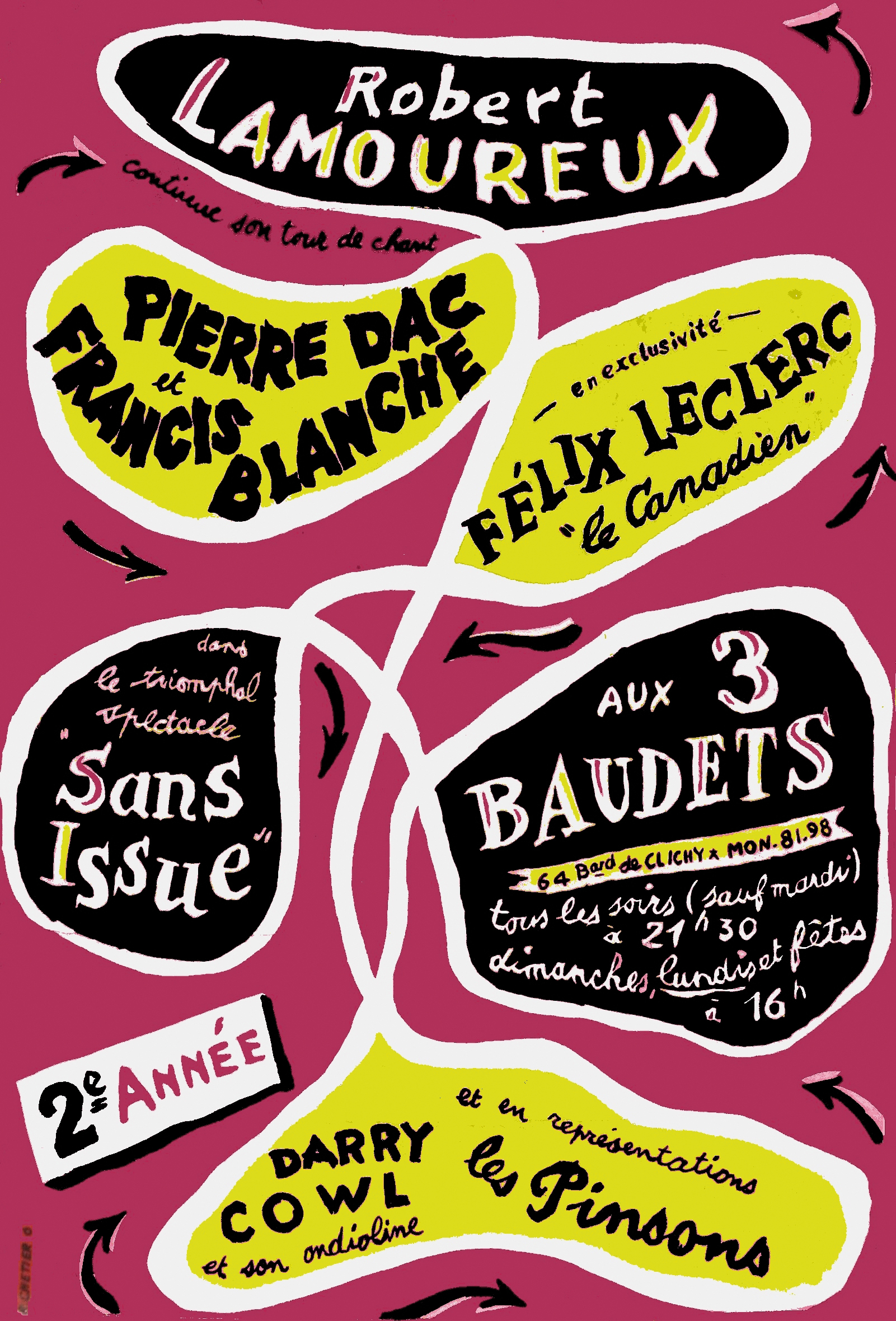
Under the impulse of Jacques Canetti, the Théâtre des Trois Baudets became an extraordinary “nursery of talents”, which gave artists the time to grow. Meaning being able to write and try out their songs and lyrics, fine tune them in front of an audience, become stage artists, overcome their stage fright, polish their repertoire, and work every day whether or not they met with success. Thanks to the Trois Baudets, the tours he organised throughout France, and the records, Jacques Canetti gave artists a chance to work regularly and to build themselves slowly.
« Developing an artist’s career… means having patience, talking, being persistent, defending them, believing in them for the long term, giving them self-confidence. It means imagining what they can become and showing them how to get the best out of themselves »
Jacques Canetti
From 1947 to 1967, the shows that took place at the Théâtre des Trois Baudets were all put together in a similar way. Every night, approximately fifteen artists would go up on stage. During the first part, 5 or 6 artists would go through their repertoire (3 to 5 songs or skits). Interlude. The second part was an author’s creation (Pierre Daninos, Raymond Queneau, Boris Vian, Pierre Kast, Francois Billetdoux etc…).
It was at the Baudets that over a hundred artists, musicians, poets, entertainers, authors and comedians began their prodigious careers. With the utmost confidence and patience, Jacques Canetti doggedly supported “his” artists through thick and thin.
The pool of talent at the Trois Baudets was made up of singer-songwriters amongst whom we could mention, Francis Lemarque, Henri Salvador, Félix Leclerc, Georges Brassens, Jacques Brel, Guy Béart, Boris Vian, Serge Gainsbourg, Jean-Roger Caussimon, Anne Sylvestre, Boby Lapointe, Leny Escudero, etc…With performers such as Catherine Sauvage, Juliette Gréco, Patachou, Jacqueline François, Marcel Amont, Philippe Clay etc…The Frères Jacques stayed for a short while after “la Rose Rouge” (they were to record Jacques Prévert’s first songs with Jacques Canetti).
Comedians such as Pierre Dac, Francis Blanche, Fernand Raynaud, Robert Lamoureux, Raymond Devos, Bernard Haller, Darry Cowl, Jean Yanne, Gérard Sety, Christian Duvaleix, Pierre Étaix, Jean-Marie Proslier, Pierre Repp began their careers there as well as actors such as Michel Roux, Rosy Varte, Philippe Noiret, Pierre Darras, Robert Rochefort, Roger Carel, Henri Virlojeux etc…
Certain pianists also began their careers there: Michel Legrand, Pierre Arnaud de Chassy-Poulay, André Popp, Darry Cowl and Alain Goraguer.
Lastly, some stage directors contributed to the success of the shows at the Trois Baudets: Michel de Ré, Yves Robert, Olivier Hussenot…
Other artists were also to shine there: Renée Lebas, Jacques Grello, the painter Georges Arditi, Alexandre Jodorowski, René Cousinier, Béatrice Moulin, Pierre Dudan, Nicole Louvier, Simone Langlois, Bob Dupac, Denise Benoît, Jean-Claude Darnal, and singing ensembles: Les Garçons de la rue, les Quatre Barbus, les Trois Horaces, Les Trois Ménestrels, les 5 Pères…
For the public, the Théâtre des Trois Baudets had a new tone, an ambiance, it was daring and eclectic… it was a hotbed of talent and, above all, it had a sense of family.
A feeling of companionship and of work reigned between the artists, whose names were practically the same size on the posters. After the show they would get together around Canetti to work on their repertoires, the lights, the music…Certain artists such as Georges Brassens, Boris Vian or Jacques Brel played the role of catalysts and were able to find the right words to encourage artists that had a tough start.
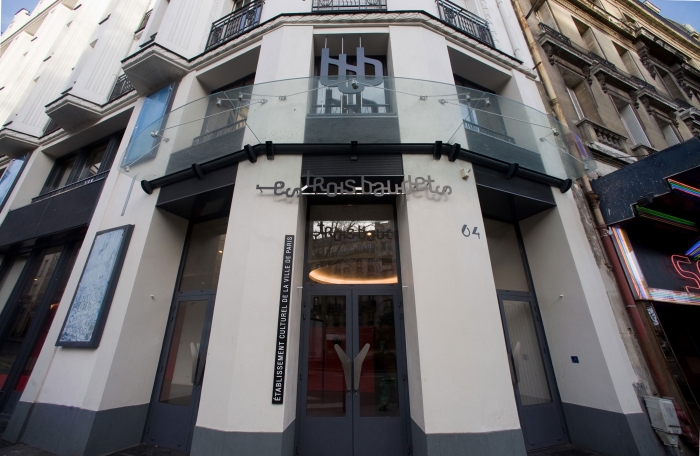
At the end of 1962, when Jacques Canetti left Philips to create his independent label, he decided to entrust the Trois Baudets to Jean Méjean. He didn’t go back until 1964, for two seasons and with new singers including Maurice Fanon, Jean Arnulf and Brigitte Fontaine…there was also the return of Félix Leclerc with the show le Petit Bonheur.
Facing financial difficulties, Jacques Canetti closed down the Théâtre des Trois Baudets for good in July 1967….The last show at the Baudets was L’affaire de la rue Lourcine by Eugène Labiche, staged by the novice Patrice Chéreau.
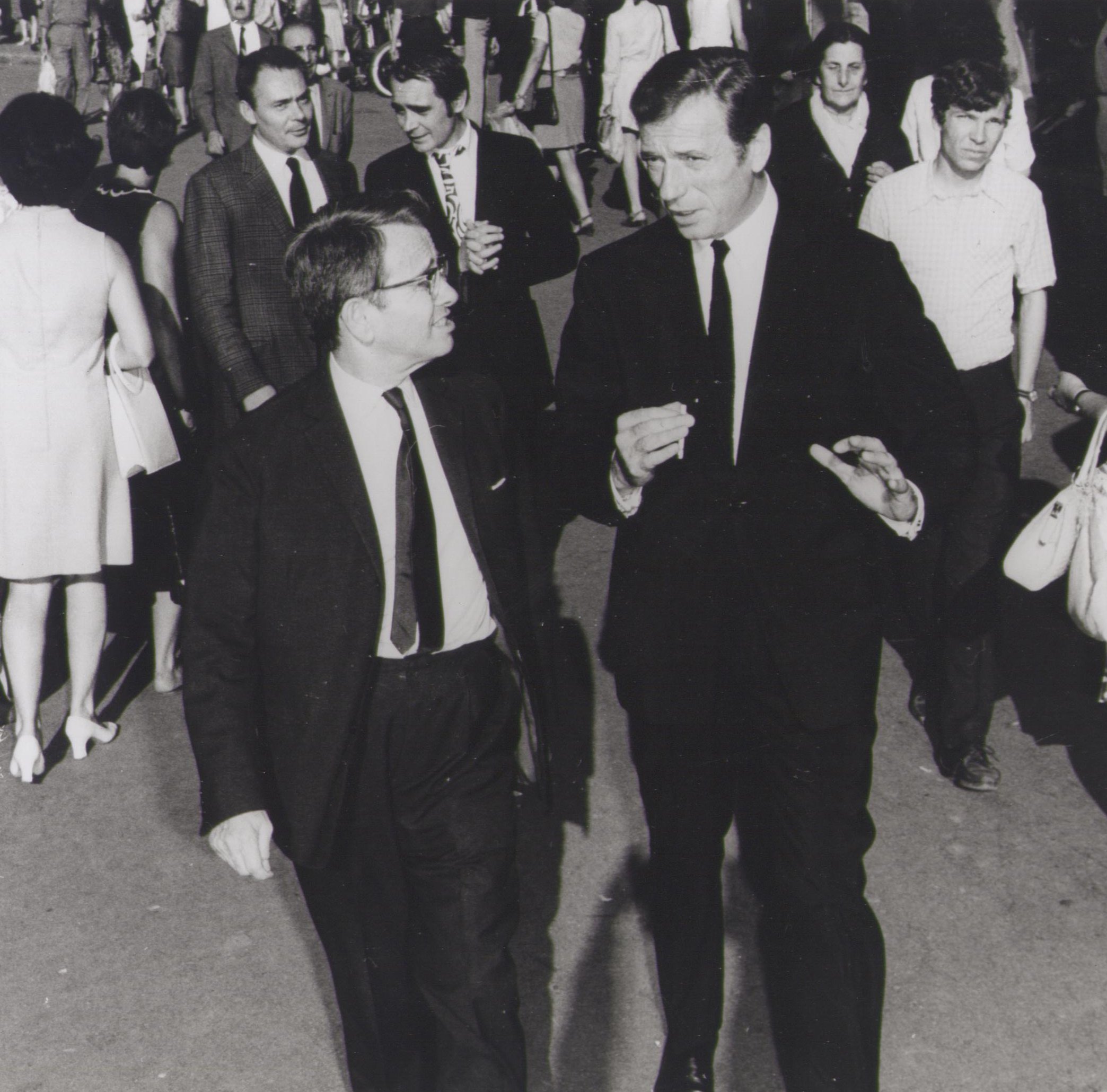
He was also an important show promoter. Jacques Canetti organized Maurice Chevalier’s concerts including the one at the Alhambra in 1956… He asked Michel Legrand to manage the music for the show and the great Alexandre Jodorowski to take care of stage design. He organised Maurice Chevalier’s shows until October 1968, when he said his goodbyes to the Théâtre des Champs Elysées.
As for Yves Montand, with whom he had built a solid friendship, he organised all his recitals in Paris from 1954 to 1968: at the Théâtre de l’Etoile in 1954 and 1958 and at the Olympia in 1968. Jacques Canetti was also the architect of his international success by organizing his first concerts in New York in 1960 and his tour of Japan in 1962.
Lastly, did you know that Jacques Canetti was the one who introduced chanson française into the temple of all theatres, Jean Villard’s Théâtre National Populaire ? There he organized the show “Georges Brassens – Juliette Gréco”, which played to sold-out audiences for over six weeks from 16th September to 22nd October 1966.
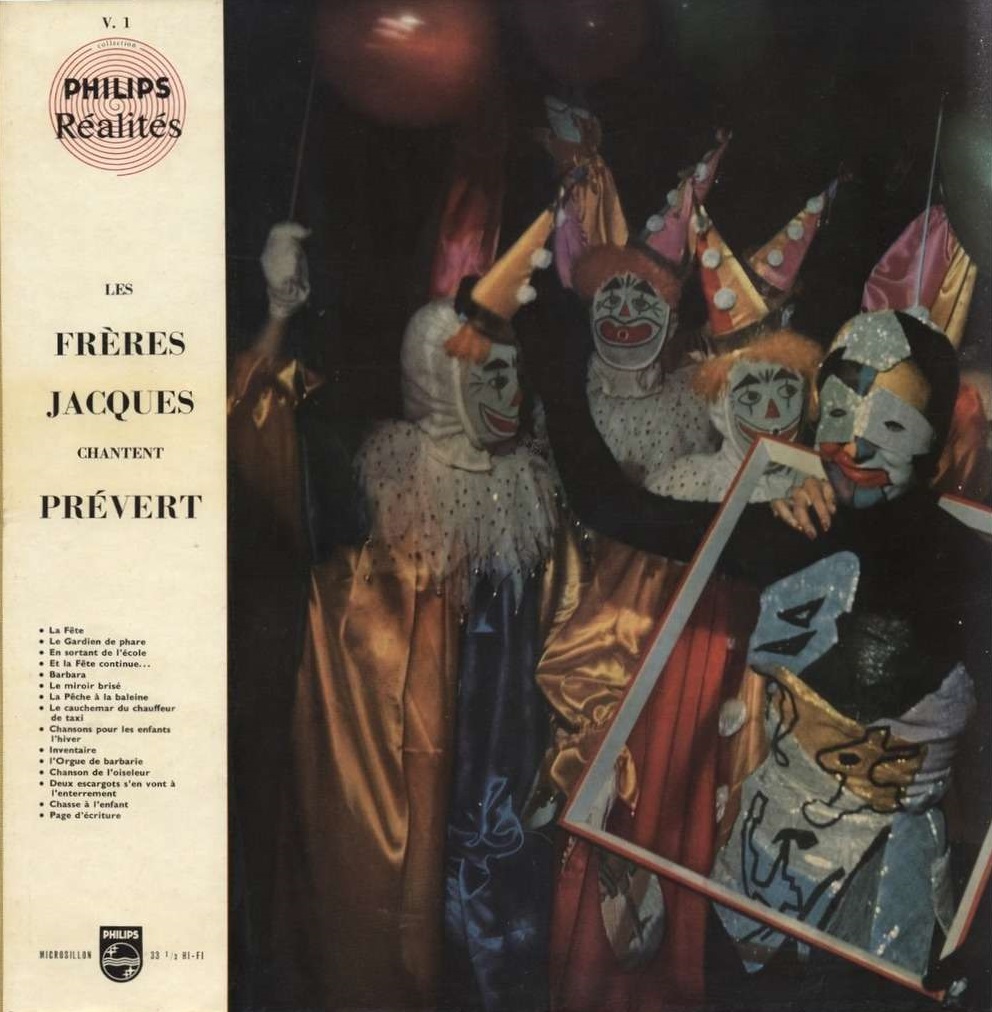
In the field of literature, Jacques Canetti “invented” the collection “20th century authors” for Philips, with prestigious authors such as: Julien Green, Colette, Malraux, Mauriac, Romain Rolland, Pierre Mac Orlan, Jacques Prévert, Georges Simenon etc…
He launched the series “Piccolo, Saxo et Cie” with André Popp and Jean Broussolle and a repertoire for a “young public” with his wife Lucienne Vernay and Les Quatre Barbus.

On his return from the USA in 1956 with Michel Legrand, more amused than convinced by rock music, Jacques Canetti asked Boris Vian to write the first French rock songs which were to be sung by Henri Salvador and then by Magali Nöel accompanied by the music of Michel Legrand and Alain Gorraguer’s.
In 1957 he entrusted Boris Vian with the artistic direction at Fontana records for jazz and song.
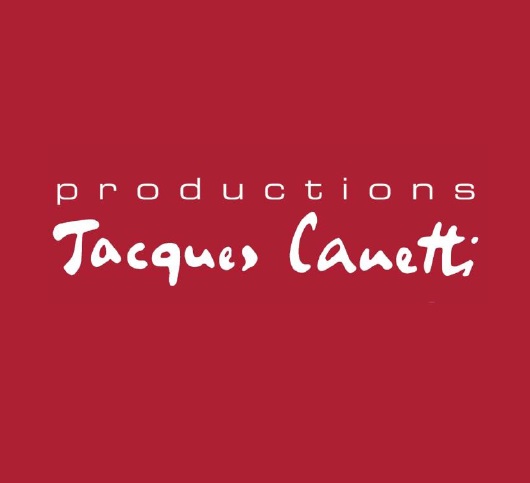
In September 1962, Jacques Canetti resigned from Philips, for whom he had created the most prestigious catalogue of chansons françaises and founded his own record label : Les Productions Jacques Canetti.
By doing so he continued to produce music as a “craftsman”, as he always had done. At the height of the pop music revolution when singles were taking over the music market, he produced albums for which he created a house-style book (his handwriting signed off on the black and white photographs of “his” artists). In 1964, Jacques Canetti produced the album Jeanne Moreau chante Bassiak. In 1965, he convinced Serge Reggiani to take his first steps as a singer. In 1965 and 1967, he produced his two mythical albums (les Loups, le Petit Garçon, Ma Liberté…). In 1966, he produced the first albums of two young unknown performers: Jacques Higelin and Brigitte Fontaine who were not immediately successful. They would be…but only much later. In 1967, he recorded a collection of Boris Vian’s songs, in 1975 one by Jacques Prévert and in 1985 songs by Jean Cocteau.
In 1974, Jacques Canetti was impressed by Eric Robrecht, the singer songwriter performer whose albums met with respectable success, then in 1984 by Jean-Marie Hummel whose career was taking off in Germany. Between 1978 and 1988, he created and produced shows of songs that he presented to the Off Festival in Avignon. His last show was a show including hitherto unheard songs by Jean Cocteau at the Théâtre du Rond-Point.
Up until the end of his life on 7th June 1997, in Suresnes (Hauts de Seine département), Jacques Canetti remained a discreet and enthusiastic man who would wander round the venues every night to listen to young singers, songwriters and performers.
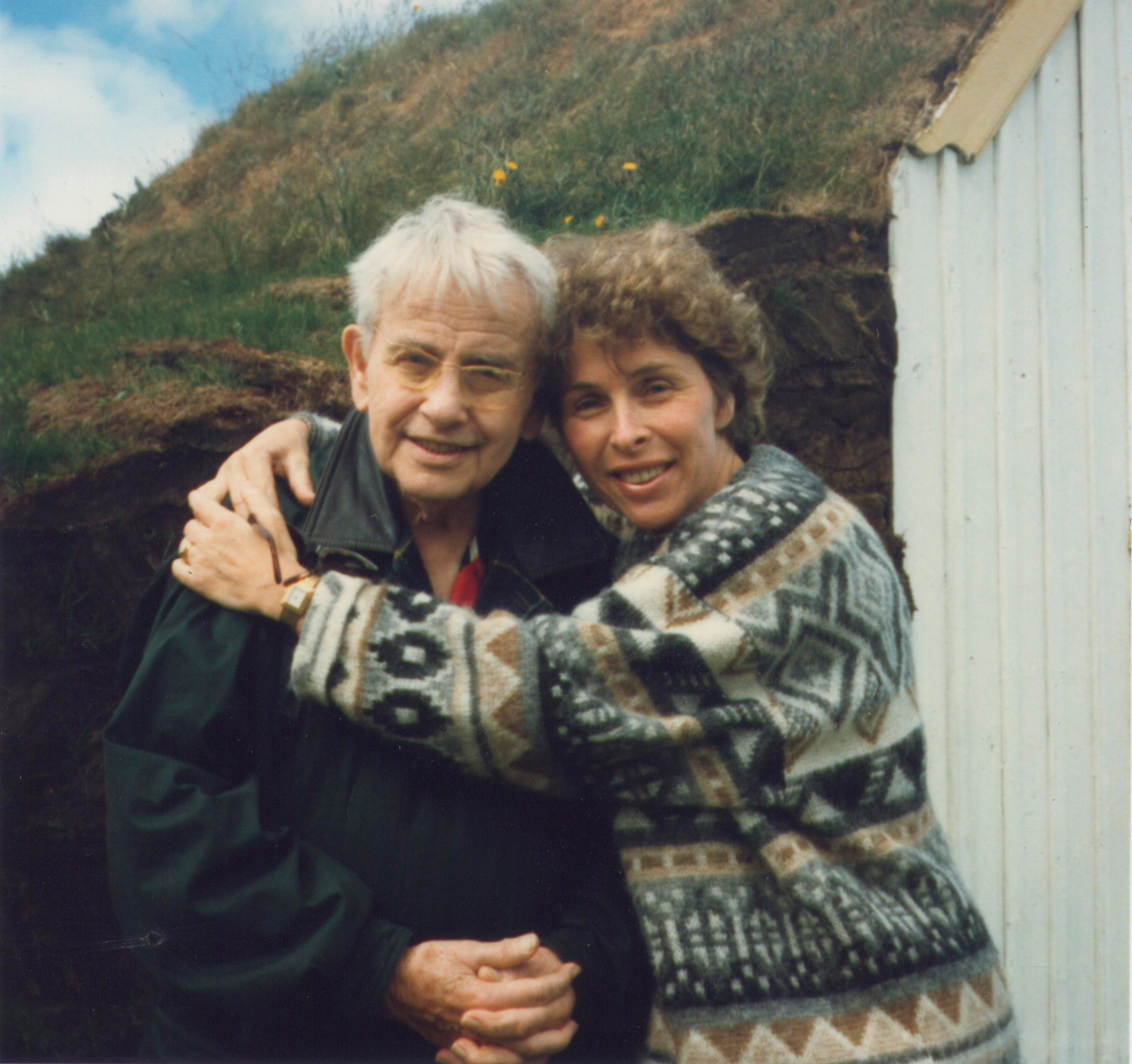
Jacques CANETTI has three children : Colette, Françoise and Bernard, all of whom are active in cultural circles. On the death of her father Françoise took over the management of the record label LES PRODUCTIONS JACQUES CANETTI. Through this independent label distributed by BECAUSE/WARNER, she promotes the catalogue created by her father, Jacques Canetti, and hopes to produce new artists.
In February 2009, at the initiative of Daniel Vaillant and Bertrand Delanoé, the town hall of Paris reopened the Trois Baudets, the venue that Jacques Canetti had created in 1947.